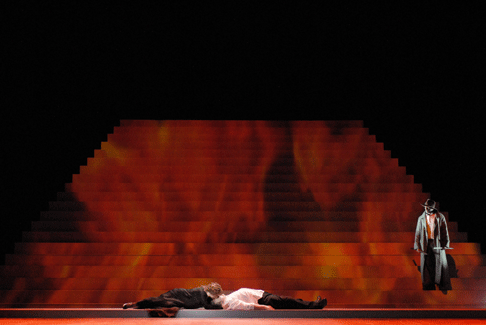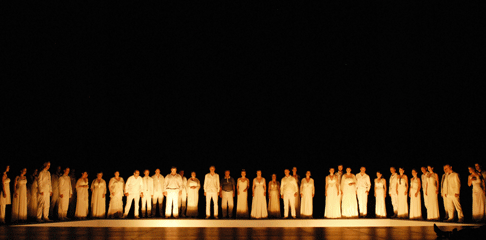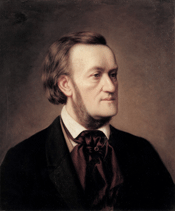Its minimalist design by Stéphane Braunschweig (stage
direction and sets), Thibault Vancraenenbroeck (costumes) and Marion Hewlett
(lighting) notwithstanding, this production delivers a compelling musical drama
that focuses on the human condition.
This production of the Ring is an important step forward in the
interpretation of Wagner’s musical drama. Absent are the clichés of
characters dressed as Nazis (or as Eastern German soldiers in the recent Knöll
production in Venice). Absent is the bewildering “balance” between
science fiction and poetry as in the recent La Fura production in Florence or
the absurdly ridiculous staging in Lisbon that employed a circus ring. Absent,
too, are cardboard reproductions of medieval German forests, rivers and royal
palaces as imagined by late 19th century intellectuals.
Rather, we finally have a psychological reading of the Ring that emphasizes
the interpersonal relationships of the dramatis personae. The staging
is minimalist. The sets consist of three walls, a window and a staircase, along
with a few abstract. The props are three chairs, a leather armchair and two
beds. Lighting and acting (what a quality of acting!) do the rest, keeping the
audience on the edge of their seats for nearly 6 hours.
A key element of Götterdämmerung, as with the Ring as a
whole, is the sequence of leitmotifs associated with a character, a
place, an event, an object and so on. The Prologue begins with the sequence
expressing primal nature and the Rhine (No. 2), Erda (No. 42) and then the
Annunciation of Death (No. 83B). A new leitmotif (No. 154) is
introduced as the Norns appear weaving the ropes of destiny, discussing past
events, the doom of the gods, the curse of the Niebelung’s Ring,
questioning the nature of a distant gleam of light (is it fire or is it
dawn?).* The Norns then disappear and dawn breaks. With the
radiant tonality of daybreak, Brünhilde and Siegfried emerge after a joyous
night of love-making. We could not be more directly assured that we are no
longer in a world of gods, giants, dwarves, dragons and demigods. We are in a
universe of men and women where mist and the darkness are contrasted against
light and the radiance. Light and radiance win. Thus, after nearly 6 hours, the
turmoil of the downfall of the gods segues to the leitmotif of
redemption by love — the old order is shattered, a glorious new world is
revealed.
Earlier productions stressed that the men and women in
Götterdämmerung stand alone with their problems (intrigues of power
and wealth) and their passions. Valhalla (with its gods and goddesses) is at a
distance. In this production, Wotan appears silently at the very end as the
Wanderer to witness the demise of “his” world — the old
order. The human psychological content of the Ring, and especially of
Götterdämmerung, is central to this production as conceived by
Bruanschweig, Vancraenenbroeck and Hewlett.

Another key to a successful production of the Ring is the
orchestra. Wagner thought of the Ring not as a cycle of operas (a
rather normal practice in 19th century Germany) but as a festival drama (where
each and every word had to be understood) with a symphony orchestra concealed
in a pit under the stage (not to be seen by the audience). Sir Simon Rattle and
the Berliner Philarmoniker transform Götterdämmerung into a symphony
of humanity searching for a better world — independent of the intrigues
of the gods, of the kings, of the dwarves, of the demigods and the like. A
similar symphonic treatment had been attempted in the mid-1970s by the
Washington National Opera in a production of Die Walküre (with Roberta
Knie at the height of her splendour). But the staging was the traditional
primeval Germany wrought in cardboard. And, with due respect to Antal Dorati,
the Washington National Symphony never possessed the high standard of quality
as that of the Berliner Philarmoniker. Sir Simon Rattle and his orchestra have
greater skills than most other orchestras in finding the right musical colours,
the gentle nuances, the always vivid imagination, especially the ability to
slide from a chamber music Wagner (e.g. Solti, Böhm) to a highly dramatic ,
black, tragic Wagner (e.g. Boulez, Sinopoli, von Karajan, Fürtwangler). This is
a Ring, and a Götterdämmerung, that demands many listenings
to appreciate the symphonic rigor and impact produced by Rattle and company. A
detail: there are six harps, as required by Wagner, which are placed just at
the centre of the orchestra under the stage. “Normal” productions
make do with two harps, often in a side box.

This Götterdämmerung benefitted from great acting and singing. At
the age of 55, Ben Heppner is a naïve Siegfried. The role is taxing, but his
voice maintained a magnificently crystal clear timbre and exhibited superb
phrasing, a moving legato and the ability to reach high C and F. Next
to him, Katarina Dalayma as Brünhilde displayed full vocal and dramatic power.
Her performance was particularly impressive in the holocaust of the final
scene. An ever young and attractive Anne Sophie von Otter appeared as
Waltraute, the desperate Walkürie tortured by the looming end of the world. The
vocally and dramatically promising Emma Vetter was a whorish Gutrune. As Hagen,
an impressive Mikhail Petrenko presented a character that was devilish, astute,
even more evil than his father Alberich (Dale Duesing). The Norns and the
Rhinemaidens (Maria Radner, Lilli Paasiviki, Miranda Keys, Anna Siminska, Eva
Vogel) were all top-notch.
In short, if you missed this Götterdämmerung in Provence, it is
worth traveling to Salzburg for performances to be held there next Easter.
Moreover, a recording of this production is in process. Look for it in your
music store.
Giuseppe Pennisi
*[Editor’s Note: The description and
numbering of leitmotifs are based on Ernest Newman, The Wagner
Operas 591-594 (Princeton Univ. Press 1949). The numbering of the
leitmotifs, however, varies from source to source. Compare Ernst von Wolzogen,
Guide
through the music of “The Ring of the Nibelung” by Richard
Wagner (Feodor Reinboth N.D.). It should be noted, however, that Barry
Millington cautions against labeling leitmotifs because the context in which
they appear rarely admits a consistently unequivocal meaning. Stewart Spencer
& Barry Millington, Wagner’s
Ring of the Nibelung — A Companion 14-24 (Thames & Hudson
1993).]


